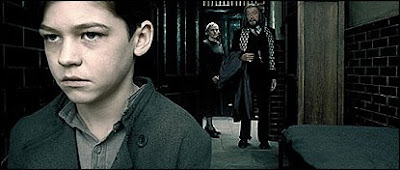 Muggles behold and rejoice. Surely this is the one that you've all been waiting for what seem like donkey's years. No, not that ridiculous 15-second IMAX trailer, which brought back the tease to the name of teasers, and offered us nothing but black and Dumbledore blathering. Now here is a better tease, and boy does it look, well, cinematic and ominous.
Muggles behold and rejoice. Surely this is the one that you've all been waiting for what seem like donkey's years. No, not that ridiculous 15-second IMAX trailer, which brought back the tease to the name of teasers, and offered us nothing but black and Dumbledore blathering. Now here is a better tease, and boy does it look, well, cinematic and ominous.
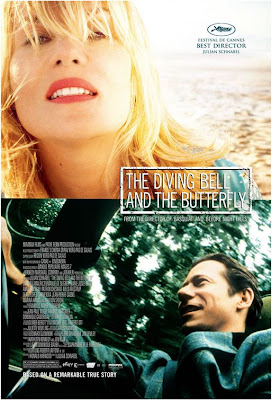 Cast: Mathieu Almaric
Cast: Mathieu Almaric
Director: Julian Schnabel
Screenplay: Ronald Hardwood
Running time: 1 hr 52 mins
Genre: Drama/Biopic
CRITIQUE:
Life-affirming dramas are painless to predict. They usually end rather, well, life-affirming. Usually they consist of main characters battling through the craps of life, then they sweep you with overflowing emotions and close to a finale that will reduce you to blowing noses into tissues. THE DIVING BELL AND THE BUTTERFLY is not that melodrama. More importantly, this is thankfully a French film, for if it would have been Hollywood, it could have been clichéd.
Here, the story is told through a first person point-of-view, and by that, excellent Janusz Kaminski’s cinematography, pensive and gorgeous, takes us into the eyes of Jean Dominique-Bauby (a performance by Mathieu Almaric that is worth to note), a patient of a “locked-in” syndrome. This illness is an after-effect of a massive stroke, which paralyses the entire body, and luckily enough, spared his eyelids, sight and imagination.
This is where the film truly delivers. It does not sweep you with too much melodrama. Bauby is a dodgy persona to like: a womanizer, a father that barely cares for his children and an easy-going life-waster. But in this tragedy, it’s a meditation on how much we waste in our lives. Bauby goes through a soul-searching experience and discovers what it really means to be alive, as he made use of a blinking eye and his wandering imagination to write a memoir.
VERDICT:
A rather poignant film about the meaning of life, the importance of imagination, and the benefits of the human spirit told in a meditative, impressive filmmaking.
RATING: A-
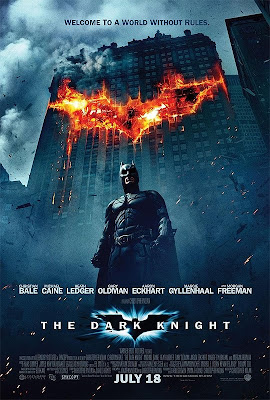 Cast: Christian Bale, Heath Ledger, Aaron Eckhart, Maggie Gyllenhaal, Gary Oldman, Michael Caine, Morgan Freeman
Cast: Christian Bale, Heath Ledger, Aaron Eckhart, Maggie Gyllenhaal, Gary Oldman, Michael Caine, Morgan Freeman
Director: Christopher Nolan
Screenplay: Christopher Nolan, Jonathan Nolan
Running time: 2 hrs 45 mins
Genre: Crime/Thriller/Action/Comic Book Adap
CRITIQUE:
Most great films in motion picture history raise moral questions on humanity: the internal struggle of the human psyche, the consequence of choice, the challenge of chance and the vital battle between good and evil – are all present in perennial classics such as THE GODFATHER, SCHINDLER’S LIST, THE EMPIRE STRIKES BACK and FIGHT CLUB, to name a few. Worth to note, sliding on the underbelly of these tales of morality are tragedies in various forms. And here is a contemporary film that draws the elements of what makes a superior motion picture. Majestic auteur Christopher Nolan’s THE DARK KNIGHT is no longer a superhero movie. It soars beyond new heights; this is a dark and brooding affair into the complexity of heroes and villains, a serious stab into the genre of dreary parody-ridden superhero flicks, and most of all, it is a disturbing portrait of anarchy and the collapse of society. By hook or by crook, one emerges from the cinema stirred and staggered, for THE DARK KNIGHT has a scope that is astonishingly surprising for a superhero movie. No wonder what the hype is all about. This is a welcome addition to being a potential perennial masterpiece – and perhaps the greatest superhero movie ever made as of yet.
No longer do we recollect the oddity of Tim Burton’s overstated Gotham nor Joel Schumacker’s emaciated vision, for they are easily overshadowed by Nolan’s Gotham: a dark, dismal city so creepily realistic and intimidating. His every shot of the menacing metropolis, which stands for Chicago, is believable. Ingeniously, there are a lot of aerial shots of the city and its cinematography remains a dark-tinged palette that parallels its ominous tale. His vision nonetheless is not without flair, mightily proven in a sequence in Hong Kong where he takes his camera into the heights of skyscrapers and plunge into a vertigo-inducing dive with Batman soaring around the cityscape.
Since the title suggests, all is dark here. Not only is it skilfully captured but it is also the moodiest, most serious superhero movie for grown-ups you’ll ever see. No ordinary ten-year old would happily view this recent outing of the Caped Crusader. It has a material that serves nary a jaunty element. Extraordinarily, for a film that runs for almost 3 hours, there’s neither a longuer nor a moment of boredom. THE DARK KNIGHT has a gripping tale, tautly edited, that consistently stabs your mind with intelligent puzzles. This is not also a simplistic tale about good and evil, nor what makes heroes super. Following closely to the superb BATMAN BEGINS, the Caped Crusader has become the saving figure of Gotham City and his cooperation with the law enforcement threatens the mob of criminals. Here, the tale swerves into a fantastic turn in the appearance of a “better class of criminal” in the form of Joker. Money is no longer the force to be reckoned with, but Joker’s self-driven philosophies that anarchy is inherent in humanity. As Michael Caine’s butler Alfred utters, “Some men would just want to watch the world burn.” One of those men is Joker, and he poses ethical riddles and moral questions on Batman himself and the city around him. On a climactic scene where the Joker forces citizens aboard different ships to make a choice – the character is so brilliantly drawn that for a moment, he’ll convince you that he’s got a point. We are the destroyer of our own civilisation, and we hope somewhere a masked crusader would arrive and save us.
And like great movies, it is a fascinating, complex exploration of characters. At the heart of this tale is a clash of four titanic egos: Bruce Wayne and his alter ego’s code of justice, Harvey Dent’s clean-cut criminal-nailing ethos, Gordon’s good cop, and the Joker’s tumultuous anarchy. Batman has started questioning his own existence, whether Gotham deserves a masked protector. He relinquishes to a saviour without a mask, Harvey Dent as Gotham’s White Knight. Whereas hope arises, chaos arrives with Joker, and everything falters. There is a subtext of tragedy in its conflicted characters that even Shakespeare would be spellbound in intricacy.
There’s not a single work of miscasting here. Christian Bale owns Batman, as much as Heath Ledger steals the whole movie. Beneath the mask of the Crusader, there’s no hint of Bale but the brutish, growling ferocity of Batman himself that would put Keaton, Kilmer and Clooney to shame. Aaron Eckhart intensely captures the tragic transformation of a good-hearted District Attorney to a vengeful marauder Two-Face. Gary Oldman remains a consistent humane persona of a loyal, uncorrupted law enforcer. But plaudits indeed go to the late Heath Ledger and his brilliantly psychopathic performance. Not since the appearance of Malcolm McDowell in Stanley Kubrick’s controversial A CLOCKWORK ORANGE has a villain so disturbingly portrayed – and in Ledger, he personifies the Joker a force of chaos with a reason, and even more so, gives the character a hint of sadness, knowing that a truly astounding actor with a talent has already left this world. He’s not the wisecracking jester with awfully corny lines, but everything that comes out of his mouth seems to be filled with classic philosophies, dropping one-liners like bombs, such as “What doesn’t kill you makes you stranger”. This iconic performance is up there with Ennis Del Mar in BROKEBACK MOUNTAIN, or perhaps greater. Ledger’s final complete bow calls for an Oscar.
Even the supporting acts are layers of a superb ensemble: Maggie Gyllenhall proves that Rachel Dawes needs feistiness and a better actress, replacing Katie Holme’s feeble presence. Morgan Freeman’s Lucius Fox as the mechanical, applied science genius and Michael Caine’s butler with a heart Alfred give humour to this otherwise sinister atmosphere.
But this tale doesn’t end the way we expect in superhero movies where everyone is saved and harmony ruled. In THE DARK KNIGHT, no one is saved, not even the Knight himself. He becomes the lone warrior that thrusts into the night unseen, a tragic characterisation of a haunted human being. And that is what has been embodied in here, a force of a film that resonates the tragedy in humanity, more or less real to our world that in superhero movies. Perhaps this is the first in its genre that needs an Oscar attention.
VERDICT:
This is no superhero movie. THE DARK KNIGHT is a staggering crime epic, an exceptional film noir that deserves serious praises. It is also a realistic, complex, haunting tale of morality and human tragedies with Shakespearean resonance. Heath Ledger is a tour-de-force. Hail THE GODFATHER of comic-book adaptations.
RATING: A+
 Cast (voices): Ben Burtt, Elissa Knight, Sigourney Weaver
Cast (voices): Ben Burtt, Elissa Knight, Sigourney Weaver
Director: Andrew Stanton
Screenplay: Andrew Stanton
Genre: Animation/Sci-fi/Romance
Running time: 2 hrs
CRITIQUE:
Ever since the honchos of Pixar Animation Studio gathered for a lunch meeting in the year 1994, animated movies have never been the same. Thanks to that celebrated lunch, four ideas were conceived. Three of them have been enduring classics: TOY STORY, MONSTER INC. and FINDING NEMO, all of which are Oscar winners. The fourth of the plethora is the tale of WALL•E, a lonely robot left on Earth to sort out mankind’s rubbish. From that premise alone, it seemed as though Pixar was making a mistake and besmirching its long-running box-office and critical record from the groundbreaking TOY STORY to the remarkable rodent romp RATATOUILLE. Who would want to watch a solitary robot gallivanting around a depressing scenery whose only company is a cockroach and the first hour consist of no audible dialogues other than electronic beep and squeaks? Certainly, not kids.
WALL•E is conceivably Pixar’s hugest risk taken. This is a far cry from the childlike entertainment it normally stamps, and having seen its transformation on screen – this is without a doubt Pixar’s most mature work to date. Its opening sequence shows a constantly overcast Earth, a sepia-clouded wasteland with skyscrapers made out of boxes of compressed rubbish; it obviously tells that this is not a child fare. Such a stunning sci-fi imagery of a dystopian future is like a nihilist’s wet-dream that could have belonged to one Stanley Kubrick, if he were alive, or perhaps Ridley Scott, if he were still making his sci-fi epics. There is no date given; we just know that this is the distant future, and this little fella is the last of its race (most of them have been dilapidated) and humans forgot to turn him off as they left the planet.
For a film that’s rare of dialogue, surprisingly its strength lies on the absence of words. Our main hero is a Waste Allocation Load Lifter, Earth-class, hence WALL•E, and he’s been working on human rubbish for nearly a millennia. His daily routine comprises of compacting waste, and another man’s junk is his treasure. No witty dialogue present but the wit lies of WALL•E’s functions and innocent, wide-eyed wonder (made out of binoculars); from his discovery of a spork to a Rubik’s cube or a brassiere, the film’s at its strongest in characterisation, most whimsical in his frolics, and most charming when he meets the sleek egg-shaped droid EVE (Extraterrestrial Vegetation Evaluator) and tries to win her company and affection.
And this is where it becomes more affecting. WALL•E is a portrait of loneliness. There is a montage where our hero tries to court an unresponsive EVE; him holding an umbrella for her being struck by lightning, him pleasing her with a Hello, Dolly! tune, him sitting with her in front of a gorgeous sunset. This is amusing, traditional romanticism via Charlie Chaplin with a Woody Allen twist. And its ravishingly loveable. It is funnier and more romantic than twenty romantic comedies combined together.
As soon as the two robots leave the planet and came aboard Axiom, the intergalactic spaceship, we finally see the human counterparts of the film. They resemble like humungous toddlers, fatter and less bone, suspended in hovering chairs with screen media in front of their faces. This, we can assume that we’re not far from this total technology dependency that everything we need is catered for, that we somehow forget to use our basic functions, our hands and feet – let alone our hearts.
Andrew Stanton takes a bold move to provide irony in his robotic creations, so did his clownfish creations, as WALL•E and EVE has more humanity than the rest of the man-species. He does not also ignore the worth of fun present in FINDING NEMO, as the film becomes a rollicking adventure slash human-and-robot rebellion from machine force, reflecting 2001: A SPACE ODDYSSEY (listen carefully to the score music at a crucial finale scene). There’s humour, pathos, intelligence and wonderful heartbreak as soon as mankind comes back to Earth. This is a daring film, and there’s nothing more magical you’ll see in cinema these days than WALL•E with a fire extinguisher and EVE cavorting around in space together, as though in perfect harmonising dance in the air.
Oh, by the way, make sure you arrive at the cinema on time, and don’t miss the short film PRESTO, a deliciously delightful war between a magician and his bunny. Terrifically entertaining.
VERDICT:
What a cinematic bliss. WALL•E, like its hero, is many things at once: a visual art feast, an engrossing sci-fi, an ambitious animation, an ecological forewarning, and above all – a moving, charming, timeless love story of two robots with a touch of humanity. This is Pixar’s pinnacle since FINDING NEMO.
RATING: A+
 Cast: Judi Dench, Kate Winslet, Jim Broadbent, Hugh Bonneville
Cast: Judi Dench, Kate Winslet, Jim Broadbent, Hugh Bonneville
Director: Richard Eyre
Screenplay: Charles Wood, Richard Eyre
Genre: Drama/Biopic
Running time: 1 hr 30 mins
CRITIQUE:
For biography pictures, the more compelling the tale, the more likely it could become Oscar bait. IRIS is without exception. Pummelled ever more forcefully to the podium by the film’s four superb performances, it seemed like an unwritten prophecy that in making biopics, seize big names and talents, and you’ll get quite the catch. Dame Judi Dench playing the mentally-distressed novelist Dame Iris Murdoch in her later years is terrific, drawing a psychologically complex character suffering the bouts of memory lapses. Kate Winslet is the younger Iris Murdoch in her Oxford years, sizzled with vitality, sexuality and philosophical instincts. Jim Broadbent should also deserve a generous applause as Iris’s husband John Bayley, and so does his younger counterpart, Hugh Bonneville.
But that’s what makes this film an elevation from your mediocre biopics, because of the brilliant performances. Shun them out of the picture and what you get is a tale of an Alzheimer’s patient, particularly a novelist, whose main waking life is all about words – and when memory is taken away from her, along with her words, there’s nothing left but an empty space, and madness. It goes backwards and forwards against time that sometimes it’s jarring to watch for its inconsistent editing. Richard Eyre proved some efforts in his direction, but it feels more like a TV-drama than a fully-pledged cinematic rendition of this troubled British novelist-philosopher.
VERDICT:
Works largely as an affecting Alzheimer’s tale touched with first-class performances, but a truly riveting drama, inferior it is.
RATING: B
Album Review: MED SUD I EYRUM VID SPILUM ENDALAUST [2008] (With A Buzz In Our Ears We Play Endlessly) by Sigur Rós
 Trust Sigur Rós to continually make unusual, ethereal music. Their last four LP studio albums had been shunted to critical acclaim, making even the most cold-hearted critic gush with praise. Their symphonies conjure vast landscapes of ice, stunning mental imagery of isolated sceneries, rough-hewn volcanoes, lush mountains and evergreen fields. To prove that point, watch BBC’s stunning documentary PLANET EARTH, and you’ll hear Sigur Rós’s verve. Their music make you imagine yourself standing in the most remote places imaginable – solitary, ponderous and existential. It sweeps you with overflowing emotions you think music is lacking the power of.
Trust Sigur Rós to continually make unusual, ethereal music. Their last four LP studio albums had been shunted to critical acclaim, making even the most cold-hearted critic gush with praise. Their symphonies conjure vast landscapes of ice, stunning mental imagery of isolated sceneries, rough-hewn volcanoes, lush mountains and evergreen fields. To prove that point, watch BBC’s stunning documentary PLANET EARTH, and you’ll hear Sigur Rós’s verve. Their music make you imagine yourself standing in the most remote places imaginable – solitary, ponderous and existential. It sweeps you with overflowing emotions you think music is lacking the power of.
With their fifth studio album, oddly titled and unpronounceable, Med Sud I Eyrum Vid Spilum Endalaust, literally translated as “With A Buzz In Our Ears We Play Endlessly” – the renowned Icelandic quartet has shrugged off the iciness of their former albums, and come up with something summery, breezy feel. That is, consistently, will also warm the iciest of hearts. In the album cover, art-photography by Ryan McGiles, four youths run stark naked across a road and onto the fields beyond under the vibrant blue sky. This alone explains the concept of the album: a celebration of youth, humanity, beauty and life. It suggests that Sigur Rós is making music without inhibitions, no pretense, no sham. Just them and their music, along with the world. This album lets your imagination run wild, into the forests, without visible clothing, no culture, no pressures, no inhibitions – just you and along with others, sprinting across a field in the brightest of the summers.
It opens with the band’s strangest conceived song to date, “Gobbledigook”, a drum-beat-ridden melody that feels like a tribal dance yet oddly pleasing. What follows is the fantastic “Inni Mer Syngur Vitleysingur”, comparable to a blast of morning sunshine in your window, uplifting and harmonic, and has one of the album’s best song climaxes. “Godan Daggin” is an acoustic beauty, and “Vid Spilum Endalaust” is like the musical equivalent of a comforting arm around your shoulder. A slow start with a touch of lonesomeness accompanies “Festival” and it builds up a crescendo of a brilliant sweeping end. “Sud I Eyrum” is a laid-back affair, much like the old Sigur Rós, but the album’s most captivating piece is “Ara Batur” (“Row Boat” in English). It is perhaps the album’s most gorgeous, most striking music chord – a sweeping song that starts with Jonsi singing with a piano and then pulling off a majestic atmosphere along with a choir and a full orchestra, a climax score that could put most movie music to utter shame. Recorded in Abbey Road, London, with Choir and London Symphony Orchestra (the one who made Harry Potter and Lord of the Rings score) – it is lonely, elegiac, exquisite and victorious. And another acoustic rendition “Illgresi”, and a piano-strung ballad “Flojtavik” follows, both fine gems of music, moving and heartbreaking. And for the first time in their career, Sigur Rós sings in the English language with “All Alright”, stroke with dreamlike propinquity and etched with honesty, as though Sigur Rós was right in front of you and singing with hearts out.
For the first time, they sound more like a band playing instruments in a room, than ethereal music and voices from the deep. It has edge and raw perfection, as this album was made in the space of three months, proving their finesse. They have already crossed language barriers, proving that English is not the official language of music. For them, music itself is still its own language, and even with incomprehensible words, you know what they’re singing about if you have imagination enough to consider – that words aren’t enough to express emotions, and music sometimes have the power to express what words cannot say.
VERDICT:
A work of pure musical artistry without inhibitions. Sigur Rós at its cheerful best that still warms the iciest of hearts. It is elegiac, haunting, victorious, and emotionally satisfying. The world’s most unparalleled band in terms of eccentricity solidifies their stamp on heartwarming music. It is also their most accessible, and perhaps one of their bests. Go to the park, plug this album to your ears, lie down on the grasses, feel the soft caress of wind, and look up to the brilliant blue, cloud-tinged sky – this album is that exquisite.
RATING: A+
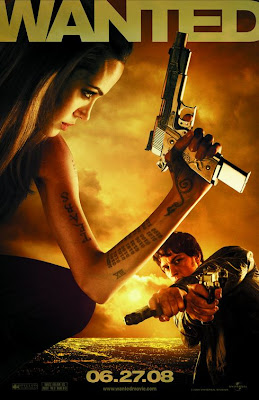 Cast: James McAvoy, Angelina Jolie, Morgan Freeman, Thomas Kretschmann
Cast: James McAvoy, Angelina Jolie, Morgan Freeman, Thomas Kretschmann
Director: Timur Bekmambetov
Screenplay: Michael Brandt
Genre: Action/Thriller
Running time: 1 hr 48 mins
CRITIQUE:
You’ve got to realise the existence of summer movies signifies the defiance to the natural laws of physics, motion, gravity – or worse, the unwritten laws of cinematic storytelling or narrative logic. Summer movies are aplenty of entertainment and slam-bang pandemonium, and with regards to Michael Bay, as a terrific example, he sees more explosions rather than characterisation, gives more fun rather than stun. WANTED, heavily branded as a summer film, possesses the attributes – but fortunately dodges the bullets of kitsch entertainment and truly delivers the much-needed adrenaline pump of the heated movie atmosphere of the summer.
It’s big, bombastic and worthy of your hundred bloody-hells. This is an absurdist, escapist fiction of a highly-stylised world absent of any moral and social pathos, but rather dwells in the darker fringes of our humanity – set in a world where a group of assassins called The Fraternity are out to annihilate targets of prospective evils. Their creed: “Kill one, save a thousand”. What follows is a tale of a nobody named Wesley Gibson (James McAvoy crashes Hollywood superstars) who inadvertently discovers his origins, and was swung away from his world of nonsensical office drone to gun-slinging bravura. If one could notice, this is a post-modernist approach to superhero origin stories, and WANTED proudly does so. It derives from FIGHT CLUB (boring office life, cue in protagonist’s narration), THE MATRIX (eye-popping visual feast of slow-mo technology) and STAR WARS: THE EMPIRE STRIKES BACK (father-son relationships) – but WANTED borrows from these stellar stories and makes it a wholly distinct universe, throwing in archaic elements and kinetic sequences that never lets you draw breath.
That’s where the lesser-known name of Timur Bekmambetov, the visionary behind the Russian breakout hits NIGHT WATCH and DAY WATCH, comes in. In his Hollywood debut film, this Kazakhstan-born director may be linked to BORAT in common national grounds but dares to quench his thirst for talent, it is quite obvious that a new actionmeister has arrived the tinseltown. There has never been a film since THE MATRIX that injects visual gregariousness, impeccable usage of slow-motion technology and genre freshness like WANTED does. While the former is groundbreaking for its originality, the latter is superb in its delivery of promise.
And there is a perfect casting effort working here. Angelina Jolie’s Fox (impeccably named, and appropriately so) may well be the finest, the most glorious cinematic assassin that ever existed. Her sex appeal is put to greater function and her felinity serves the character with grace, yet with such dangerous ferocity lurking beneath. Her stunt with a red sports car might cause endless man-fantasies, and by the time she locked lips with McAvoy, the blokes can’t help but groan “that lucky bastard!” Morgan Freeman as Sloan is a work of dignified pried, and his presence is a worthy one. But it’s James McAvoy’s transformation from a Scottish doctor to an English World War II soldier, and now a neglected nobody to a behemoth A-Lister. He perfectly pins down Wesley Gibson’s idiotic nature, foolish determination and steely character. And he could do action movies, that’s what matters.
If you try to leave an ounce of logic at the door and forget the laws of physics, open your mind and let it go along with the rush of speed. This fast-paced actioner will stun you, along with its bendy storyline, there are twists along the way you wouldn’t expect. If you start asking for the sinuous origins of the Looms of Fate, or The Fraternity’s omnipresent existence – then you are questioning the reality that this is a work of fantasy. Enjoy it and let it blow your mind.
VERDICT:
This may be 2008’s zaniest, zippiest, most cracking summer action movie. WANTED may be filled with bombast, plot holes and brow-raising moments – Bekmambetov’s jaw-dropping visuals, along with Jolie’s enthralling presence, McAvoy’s superlative zero-to-hero transformation, Freeman’s ominous authority – it is an arresting, hyperkinetic piece of entertainment.
RATING: A-
 Sigur Rós conjures visceral images of snow-streaked landscapes, panoramic vistas of ice-capped mountains, and rough-hewn Earth surfaces - and their music accompanies them with stark perfection. This Icelandic quartet's fourth LP studio album might well be their momentous masterpiece, yet calling that would outshine the brilliance that came before TAKK... ("Thanks..." in Icelandic), with the rough beauty of AGAETIS BYRJUN and the compelling wordless, lyricless (). TAKK... is a complex harmony of music, haunting, beautiful, serene, overwhelming, invigorating, epic, to which any thesaurus would surely give up to express the perfection of this music. And this album is one of the very bests I've heard in my whole humanly existence.
Sigur Rós conjures visceral images of snow-streaked landscapes, panoramic vistas of ice-capped mountains, and rough-hewn Earth surfaces - and their music accompanies them with stark perfection. This Icelandic quartet's fourth LP studio album might well be their momentous masterpiece, yet calling that would outshine the brilliance that came before TAKK... ("Thanks..." in Icelandic), with the rough beauty of AGAETIS BYRJUN and the compelling wordless, lyricless (). TAKK... is a complex harmony of music, haunting, beautiful, serene, overwhelming, invigorating, epic, to which any thesaurus would surely give up to express the perfection of this music. And this album is one of the very bests I've heard in my whole humanly existence.
And that's what makes Sigur Rós one of the most important bands exist in history, for they're not only a band, but a band of musicians. And who says English is the official language of music. Music itself is the language of music. Sigur Rós transcends language barriers and cultural ethos to wholly capture expressions that words aren't enough to gesticulate. This is the identity that Sigur Rós can be proud of, and their music is certainly one of the most important in the modern world. It makes us ponder our very own existence. Even Coldplay, one of the world's biggest bands, is an enormous fan of Sigur Rós, the likes of Brad and Angelina are their followers, Gwyneth Paltrow's daughter Apple arrived into this world with the tune of Hoppipolla - who could not be enraptured with Sigur Rós's testament of beauty and pathos, beautiful and tragic altogether.
From its wordless opener "Takk..." to the rythmic beat of "Glosoli" followed by the stunning, operatic, marvelous grandeur of "Hoppipolla" and its emotional sequel "Meo Blodnasir", you'll know this album is out of the ordinary. Yet the sheer brilliance doesn't end there, as it carries on with "Se Lest" and "Saegopur", songs which are emboldened with loneliness, subtlety and grace. And there are more delights in this collection of symphonies, like treasures to your ears. Without a doubt, Sigur Rós is one of the most important post-rock heroes to have ever surfaced musical history, since Pink Floyd.
VERDICT:
This is a magical album. Quite extraordinary. Sigur Rós makes that music that makes you feel strangely alive. This is music at its most moving.
 Cast: Janet Leigh, Anthony Perkins, Vera Miles
Cast: Janet Leigh, Anthony Perkins, Vera Miles
Director: Alfred Hitchcock
Screenplay: Joseph Stefano
Genre: Horror/Suspense
Running time: 1 hr 49 mins
CRITIQUE:
It’s a widespread, generally accepted fact that with PSYCHO, the breed of the horror genre was born. Alfred Hitchcock’s unsettling masterpiece is without a doubt The Godfather of modern horror and slasher films. He is the modern horrormeister; manipulating visuals to create a mood, uses his camera in visual flourishes to intensity a story without ignoring the vitality of dialogues, and generate shock value to audience with the use of montage and expert use of sound. In PSYCHO, his dexterity is something to behold, that we are indeed watching a supreme filmmaker in his finest craft.
And who could ever forget the ill-fated tale of a runaway secretary Marion Crane (Janet Leigh), who inadvertently steals a stash of forty-thousand Uncle Sam bucks in the name of infatuation, and ends up in a faraway motel, the Bates Motel, in an almost deserted off-road landscape. Now, of course, everybody in the world knows what happens to her eventually. She ended up as that lady who gets stabbed in the shower in one of cinema’s most shocking scenes. Here the art of filmmaking is shown in its most perverted, shocking and rousing form. To add bits of information, this famous, or rather infamous, shower scene took Hitchcock to shot in seven days with forty camera sets, and such effort goes down to history as an auteuristic approach to visual montage. White-tiled shower room, a flash of skin, a knife in the air, plunging down into the skin of our damsel in distress, monochromatic blood spurting and flowing down along with water – yet no exploitation of breast neither gore, knife-into-body explicit show – and all we have is the masterful use of sound (everytime you hear that chilling music, it raises hair), the expert placement of editing, and the claustrophobic setting the elicits voyeuristic shock. This is the power of cinema, and Hitchcock has brutally manipulated the audience, and with good reason.
Repeated viewings might diminish the horror factor, but it will remain to be a scene worth studying in cinematic levels. This iconic scene alone makes this film worth watching, yet one must not forget the dementia of its story and characters. The remarkable Anthony Perkins as the troubled Norman bates is also an excellent study of human character. He delivers a twist, although predictable as soon as you see him, but is never absent with depth. Everything in this film is just creepy. And you wouldn’t want to take a shower in a motel, ever. Or go into houses on haunted-looking hills.
VERDICT:
Seminal and incendiary, cinematic buffs will always revere how Hitchcock pulls out the elements to create a graceful horror film, psychologically complex, and visually masterful that has been highly influential as ever. Not one in cinematic history has surpassed the art of stabbing knives like Hitchcock does.
RATING: A+
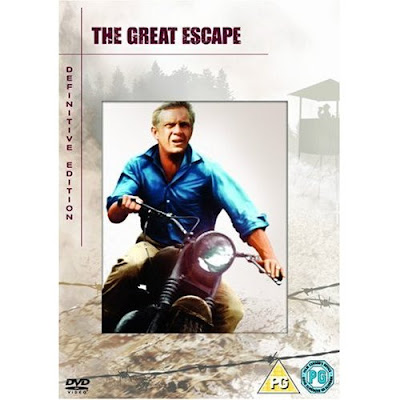 Cast: Steve McQueen, James Garner, Richard Attenborough
Cast: Steve McQueen, James Garner, Richard Attenborough
Director: John Sturges
Screenplay: W. R. Burnett
Genre: Action/Adventure/War
Running time: 2 hrs 57 mins
CRITIQUE:
For a World War II film, THE GREAT ESCAPE is essential. A true story about a plethora of men, all British, American and Canadian prisoners-of-war in the Nazi-occupied Germany, embark on a plan of escape, both successfully and tragically, making them unsung heroes that had defied the enemy and crossing the lines towards freedom. It’s a symbolic bravura, and so is the film, which handles the material with such joviality you wouldn’t believe it’s actually a war film. There is humour and playfulness with John Sturgess’s vision of this original prison break that it never plunges into morose seriousness, and captivates audience with its entertaining mood. In short, it’s a serious story taken not so seriously.
So it lives up with its brand of genre, an action-slash-adventure, and it makes this one of the greatest prison break movies of all-time, if not the greatest. Your PRISON BREAK and ESCAPE FROM ALCATRAZ have their own granddad and THE GREAT ESCAPE it is. From the brilliantly-staged escape plans, the silly tunnel plots with uncountable accomplices, it seems as though the whole camp is involved except the guards, to the finale filled with adrenaline. It can be called one of the best popcorn movies, too. And who could ever forget Steve
McQueen’s memorable and legendary motorbike dash around the panoramic German countryside, with Nazi officers hot on his heels, or wheels rather. McQueen makes his own stunts and goes down to cinema history books for it. This finale alone is worth seeing, compensating the slightly weak first half.
VERDICT:
The title suggests this film to be great, and it is. Its last half covers the oftentimes unedurable longeur and slightly weak first half; it remains to be a great escape movie, with flaws. This is a kind of film your grandad would endlessly talk about during tea-time.
RATING: A-
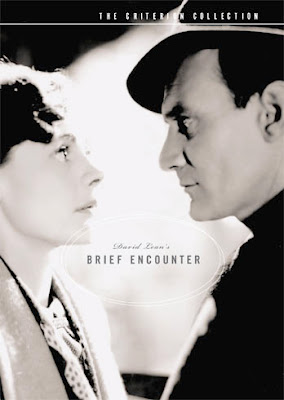 Cast: Celia Johnson, Trevor Howard
Cast: Celia Johnson, Trevor Howard
Director: David Lean
Screenplay: Noel Coward
Genre: Romance/Drama
Running time: 1 hr 37 mins
CRITIQUE:
To call BRIEF ENCOUNTER as David Lean’s most affecting film is arguable, but to call it one of the best British love story ever told is only just. And love story it is, of tainted reveries, of shattering emotions and heartbreaking reality, BRIEF ENCOUNTER not only tells a story of a love-that-cannot-be but it also resonates to the morality of our modern times.
Here is a tale of a housewife, beginning at the story’s end and told in lonesome flashbacks, who narrates her encounter with a stranger on a railway station during her daily episodes of town-strolling and cinema-viewing. Laura (a subtle, nuanced performance by Celia Johnson), in her cut-glass, clipped English accent, doesn’t sigh and groan during her reminiscences in her mind but speaks in heartbreaking honesty, like a confession that comes straight from the heart. Her domicile belonging and strict middle-class upbringing tells her to eschew the forbidden love she had found, with an erudite practitioner Dr Alec Harvey (Trevor Howard) – who happens to be also married. Yet this story is bound to end the way it is supposed to end, albeit one could tell they are soulmates, but social and moral issues lies in its undercurrents. The removing of a grit out of someone’s eye turns into a secret love affair that does not go beyond a kiss, which in turns transforms into a sensible yet heart-shattering story.
David Lean, whose masterpieces include LAWRENCE OF ARABIA and DOCTOR ZHIVAGO, shot this film in the most starkly beautiful black-and-white and one of the best in its time. He directed this with grace and such moving poetry, and its dialogues are written as though with the most perfect lines in a poem. One can’t just help to believe in its compelling power that love is not always selfish – it can noble.
VERDICT:
An exquisite piece of cinema. You come out besotted and heartbroken, and most importantly, you distinguish it as a true classic. Your parents (and grandparents) will cry rivers, and so do you.
RATING: A+
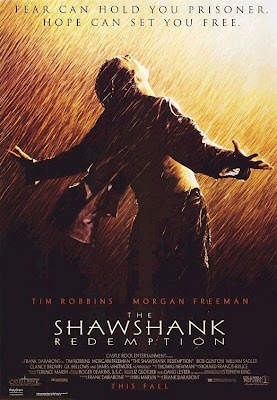 Cast: Tim Robbins, Morgan Freeman
Cast: Tim Robbins, Morgan Freeman
Director: Frank Darabont
Screenplay: Frank Darabont
Genre: Drama
Running time: 2 hrs 25 mins
CRITIQUE:
This has got to be one of the most enduring classics of our time. This is a superbly-written and directed film about a tale of hope, friendship, redemption and forgiveness that’s subtly enclosed under the outer shell of a prison movie. And when it speaks its bitter truths and hard-hitting realities, it goes straight to the heart. THE SHAWSHANK REDEMPTION could have been a film that easily strays into melodrama and over-sentimentality, but its assured direction from classy filmmaker Frank Darabont makes sure it delivers its points, and its writing makes it all the more compelling to sit and watch.
What could have also been a prison break movie, one expects bullish characterisations of thuggy personas, stereotyped in prison films, with added violence and brutality. However, SHAWSHANK retains its dignity and gives more spotlight on the importance of storytelling in a gentle, quiet and dignified manner. We meet Andy Dufresne (an excellent Tim Robbins) who was wrongly sentenced of life imprisonment for allegedly murdering his wife and her lover. The film never says he’s guilty of the crime, and lets the audience ponder of his ambiguousness. The Shawshank Prison becomes his lair but neve his barricade. He led a clean life, albeit being molested, and found an unusual friendship with one of his inmates Red (Morgan Freeman delivers his seemingly best here). The narrative point of view shifts to Red as Freeman becomes the narrator, as he starts to identify himself and his wonderment to Andy’s deep-seated acceptance of his fate, as he claims his innocence despite of all the lies around him. This becomes his hope, and he never fails, to which leads to his mostly deserved freedom.
Based on Stephen King’s novella “The Shawshank Redemption and Rita Hayworth” (no, it’s not horror fiction, presumably King’s first non-horror writing piece), the tale transforms seamlessly to provide both a heartwarming and heartbreaking sincerity. Anyone who isn’t moved by the inexorable determination of Andy and his belief of the human spirit is a stone-cold antihuman. Who doesn’t resolve to tears when Andy ambushes the Head’s office only to put on a classical music for the rest of his jailmates to hear outside? Who doesn’t feel touched by Freeman’s exposition of the old librarian who achieved freedom finally but remains “institutionalised”? It gives us the choice, either to “Get busy living, or get busy dying”.
VERDICT:
THE SHAWSHANK REDEMPTION is one of the most life-affirming films a human being could ever see – and when it does, it stays and will always do. This is beautiful, compelling, uplifting stuff.
RATING: A+
 Cast: Manuela Velasco
Cast: Manuela Velasco
Director: Jamie Balaguero
Screenplay: Jamie Balaguero
Genre: Horror
Running time: 1 hr 30 mins
CRITIQUE:
Is this one of the best horror movies of all-time? It’s excruciating to ignore its spook-factor and insensible to call it a contemporary classic for [REC] (or Record) takes a post-modernist approach to the genre, borrowing themes from George A. Romero’s zombie flicks and the pseudo-realist atmosphere of groundbreaking THE BLAIR WITCH PROJECT. However, it cannot and should not be deprived of being a cinema verité. With all its realism, audience know straight away as soon as they see the charming and feisty Spanish actress Manuela Velasco reporting for the faux show “When You’re Sleeping” about firefighters and their headquarters on a supposed-to-be uneventful night, this is the journalistic approach to witnessing horrific events, captured by a reporter’s cameraman strategies and the thirst for breaking news. This lies beside the Youtube-generation embraced by the stunning CLOVERFIELD, that momentous events are actually captured by ordinary people with camera phones and shaky camera works, or documentarians in the gobsmacking THE BLAIR WITCH PROJECT and not-so-impressive DIARY OF THE DEAD, Romero’s latest and unending addition to his undead franchise.
Resultantly, and quite gladly with such manic glee, [REC] is effective. In fact, if you crave for realistic depictions of videographic disorientation, then you’re in the right dark alley of terror and claustrophobia. One journalist’s humdrum of reporting turns insane and terrorising as they are pulled into a maelstrom of horrific events, being locked up in an apartment complex as a virus breaks out in the building. What ensues is an execution of such compelling believability, as the threads are pulled together in the plot, inhabitants start eating each other’s flesh. Albeit it feels staged, it employs a stylish atmosphere, a sort that one experiences in a horror-house with no way out. It also has a finale that will grip you, barely unleash you to breathe as the survivors run around the building finding a place to hide – plus an epilogue that’s unsettling, bordering the supernatural realm with added night-vision factor that’s as nightmarish as your scariest fantasy. We know this is audience manipulation, but movies like this manipulate audience extremely well. Kudos to new horrormeister Jamie Balaguero.
VERDICT:
Put this on a lacklustre night, turn off all the lights, amp up the volume, and prepare for an all-out-scare. It is terrifying as it is convincing, engaging as it is disorientating. [REC] is an almost perfectly staged horror-house of a film.
RATING: A-
 Cast: Will Smith, Charlize Theron, Jason Bateman
Cast: Will Smith, Charlize Theron, Jason Bateman
Director: Peter Berg
Screenplay: Vy Vincent Ngo
Genre: Action/Superhero
Running time: 1 hr 40 mins
CRITIQUE:
The only best element in Will Smith’s new parade of summer chartbuster called HANCOCK is its daringly original concept – an antithesis of all superhero movies, an existential antihero that almost satirically flips over a big, fat middle finger to all comic book heroes. For the first half of the film, it feels like an indie film is hidden beneath the gargantuan marketing and commercial cloak and marquee names: a swaggering, unsympathetic, boozy character which happens to possess superhuman abilities. And unlike any other superhero films, the public knows John Hancock. The problem is he doesn’t give a damn. One major question in the premise though, if Hancock don’t give a flying fart about the citizens, then why the efforts of Hancock helping around, albeit stoned, saving lives?
That film with a premise and potential, however, strangely gets lost inbetweeny. As soon as Hancock employs the helping hand of a PR expert Ray Embrey (a modest addition from Jason Bateman) to tweak his public image, he stumbles into his PR’s wife Mary (Charlize Theron), and along with it, the film stumbles, too. Or perhaps, more appropriately, it started to lose its style and cinematic cajones. By the time Hancock starts to rehabilitate and thrusts a message of self-redemption, it becomes more forced than effortless. The humour is present and well, as one would expect from a Will Smith film, aside from occasional misfires of a bland script, but it suddenly goes bonkers in its penultimate climax, a showdown in Los Angeles between Hancock himself and an old flame, heavy in CGI and over-the-top, and even more bonkers when it sacrifices sensibility for schmaltz, opting for pushing the envelope further with emotional content than satisfying the summer audience its intended for. Its failure lies in the fact that it feels forced. A finale that touches the elements of death, sacrifice and a love-that-cannot-be seem to oddly exist in a film that wasn’t with any trace from the beginning, and cue sweeping music to ensue supposed heartbreak, it’s a proof that HANCOCK is so uneven like someone’s spiky hair.
Thankfully, it’s partly saved by Jason Bateman who looks as though he hasn’t got a clue he’s actually working on a superhero flick and the sweet Charlize Theron who pulls out some unexpected depth to her character. Will Smith remains the likeable protagonist like he does in his other films. One can call this “another Will Smith” film, but largely, his acting capability is undermined by his own films. But sadly, his character never soars.
VERDICT:
What disappointment it is when a good concept staggers due to its big ambitions. HANCOCK is funny at times, but when it tries to be profound, it’s strangely shallow and unaffecting.
RATING: C
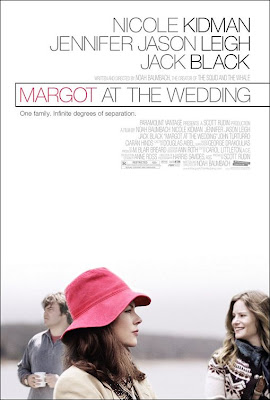 Cast: Nicole Kidman, Jennifer Jason Leigh, Jack Black
Cast: Nicole Kidman, Jennifer Jason Leigh, Jack Black
Director: Noah Baumbach
Screenplay: Noah Baumbach
Genre: Drama/Indie
Running time: 1 hr 33 mins
CRITIQUE:
With the sheer hard-hitting brilliance of Noah Baumbach’s superb debut THE SQUID AND THE WHALE, which earned him an Oscar nom, it’s tough not to attach expectations for the follow-up. What we get with MARGOT AT THE WEDDING is almost a replica concept-wise, except that the parents of THE SQUID AND THE WHALE are nowhere to be seen, and the siblings are two sisters. With this, Baumbach might unconsciously leave his imprint for dysfunctional family films the way M. Night Shyamalan does for twisteroos, or Hitchcock for suspense in that matter. It tackles disturbed familial relationships, painful memories and dysfunctional situations, a whole sphere of subjects that has been tackled before. It can be acerbic, painful, dry-witted, and oftentimes funny – but it never delivers that sharp, edgy impact that THE SQUID AND THE WHALE brought with brute, realistic force.
Baumbach focuses the tale to sisterhood, the rivalries and the bitter emotions underlying smiley faces. Freshly devastated from relationship and failed novelist, the titular Margot visits her sister Pauline with her son for her wedding. One major problem: Margot loathes the idea of having her sister being wed to a po-faced scumbag-looking loser, played by Jack Black. From this, memories are uprooted from a distant past to threat the present prospect of wedding. If you’re looking for a romantic comedy, this is not it and weddings are not the indication for romantic comedies anyway. Here, everything is in acid temper; the almost sepia-toned look of the film gives it a dull, lifeless meaning, perfectly combining with the subject matter’s troubled atmosphere.
The best facet in the film, meanwhile, is its performances by the well-cast actors. Nicole Kidman is pitch-perfect as the titular Margot, a resolute, selfish, despicable scum of a human being, tainted with flaws and bitter resentment to her own life without having the strength to admit her own failures, hence making everybody’s life around her a misery. Jennifer Jason Leigh is almost equally superb as the more flighty sister Pauline. Jack Black, on the other hand, albeit a good choice for the role, tries more drama than comedy, achieves a certain success yet still doesn’t quite pin down away from his comfort zone.
VERDICT:
The talents are oozing from this, director’s craft and actors’ performances are excellent, most notably Kidman’s caricature of the impenetrable Margot. But it’s more like an observation rather than a solid execution.
RATING: B
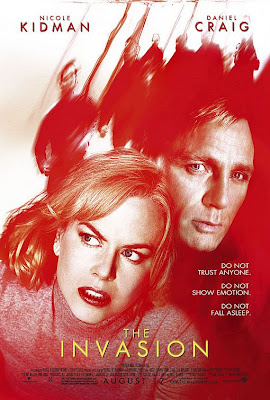 Cast: Nicole Kidman, Daniel Craig, Jeffrey Wright
Cast: Nicole Kidman, Daniel Craig, Jeffrey Wright
Director: Oliver Hirschbiegel
Screenplay: Dave Kajganich
Genre: Thriller/Sci-Fi
Running time: 1 hr 39 mins
CRITIQUE:
Somewhere along the running time of the recent umpteenth remake of the seminal THE INVASION OF THE BODY SNATCHERS, there are two established, good-looking, talented actors trapped within the misery of the film’s conventionality. Nicole Kidman (an appreciable performance undermined by her slippery character) and Daniel Craig (a good actor in a not-so-good role) are testaments that no matter how enormous Hollywood marquees could flash their names, there will always be a scintilla of chance that they’ll be unconsciously drawn into a disappointing project. Here is THE INVASION, both a suspenser and a messenger, it tries to amp the ante, whizzing us into the atmosphere of the zombified society while injecting a complex affair of philosophical dogmas and political undercurrents. The result is a confusion of subterranean mess.
The story is nothing compelling. A psychiatrist discovers that people around her are not what they seem to be, and when she discovers along with a co-doctor that an alien virus has “snatched” the bodies of the citizens, it is time to run. She embarks into a painful journey, with herself as infected, betraying her human emotions, to save her son. And of course, prevent herself not to fall asleep.
Despite of its thrilling efforts and some chilling moments, the film’s main flaw lies on the editing room. Somehow this films moves without any hint of subtle flow (not that it should be complained for it’s a thriller), but scenes feel like they are stacked up instead up being piled up neatly. It also strives to be politically correct with the philosophical values it implies: citizens being controlled by a virus, which is believed to be a governmental conspiracy, and that human passivity is the solution to the global crisis of wars and conflicts. That is all very well, but see the dinner scene where Kidman’s character academically argues with a Russian elite, who claims that terrorism, starvation, genocide are part of being human. So killing millions of people is part of being human? It borders the territory of confusion.
Potentially speaking, it could be a far better film, if not for the very much obvious staged attempts to thrill. See car chase near the end where for some reason somebody throws a flame-thrower to make the speeding car awesome to behold. It’s indeed awesome, but strangely unfulfilling. It leaves you without bare explanations, tied with a script that’s without life as its zombified creatures.
VERDICT:
Feels more like a contrived effort rather than an effortless remake. The undercurrents that once made the original compelling are lost without a trace here, and only Nicole Kidman’s presence in this film remains an impression.
RATING: C
Followers
Blog Archive
- December (3)
- November (1)
- October (6)
- August (2)
- July (3)
- June (4)
- May (4)
- April (8)
- March (3)
- February (6)
- January (11)
- December (2)
- November (7)
- October (4)
- September (9)
- August (8)
- July (11)
- June (13)
- May (12)
- April (7)
- March (11)
- February (14)
- January (16)
- December (6)
- November (15)
- October (3)
- September (11)
- August (10)
- July (16)
- June (10)
- May (11)
- April (2)
- March (6)
- February (16)
- January (15)
- December (3)
- November (3)
- October (9)
- September (8)
- August (4)
- July (8)
- June (9)
- May (9)
- April (21)
- March (13)
- February (12)
- January (12)
- December (6)
- November (25)
- October (18)
- September (13)
- August (14)
- July (12)
- June (18)
- May (8)







